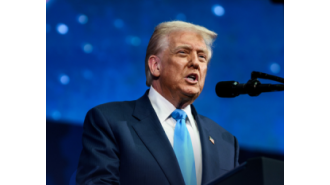Trump warns of imposing tariffs on Mexico, Canada, and China as soon as he takes office.
Trump plans to implement high tariffs on Mexico, Canada, and China to combat illegal immigration and drug issues when he becomes president.

The upcoming presidency of Donald Trump has been marked with bold and controversial actions, and his latest move is no exception. In a series of posts on his social media platform, he announced his intention to impose hefty tariffs on Mexico, Canada, and China as part of his efforts to address illegal immigration and drug trafficking. These tariffs would include a 25% tax on goods from Mexico and Canada, and an additional 10% on products from China, which he plans to enact through executive orders on his first day in office.
The potential impact of these tariffs is significant, as the United States is the largest importer of goods in the world and these three countries are its top suppliers. This could lead to a sharp increase in prices for American consumers, affecting everything from gas to automobiles to agricultural products. Despite this, Trump remains committed to his stance, citing his concerns about the influx of illegal migrants and drugs through the southern border, even though recent data shows a decrease in apprehensions.
In his posts, Trump also directed his attention to China, stating that he has had numerous discussions with the country about the importation of drugs, particularly Fentanyl, into the US, but to no avail. He threatened to impose an additional 10% tariff on Chinese goods until they take action to stop this issue. It is unclear whether Trump will actually follow through with these threats or if they are simply a negotiating tactic.
The Canadian government has responded to Trump's posts, with Prime Minister Justin Trudeau speaking to Trump about the border and trade. While the conversation was described as good, it's uncertain how Canada will respond to Trump's demands. The situation with Canada is complicated by the fact that arrests for crossing the border illegally from Canada have been on the rise in recent years, with a significant number of those arrested being Indian nationals.
As Trump prepares to take office, his nominee for treasury secretary, Scott Bessent, has previously expressed support for tariffs as a means of negotiation. However, the potential consequences of these tariffs, such as inflation and higher prices for consumers, could have a significant impact on the economy and the Federal Reserve's decision on interest rates. It remains to be seen how Trump will handle this issue when he officially becomes president.
As the dust settles after the heated 2024 presidential election, President-elect Donald Trump is already making waves with his bold plans for the country. In a recent announcement, Trump threatened to impose significant tariffs on Mexico, Canada, and China as soon as he takes office. This move is part of his larger effort to address the issues of illegal immigration and drug trafficking.
According to Trump, he plans to impose a whopping 25% tax on all products coming into the United States from Canada and Mexico, and an additional 10% tariff on goods from China. These tariffs, if implemented, could have a major impact on the prices of goods for American consumers, including gas, automobiles, and agricultural products. This is because the United States is the largest importer of goods in the world, with Mexico, China, and Canada being its top three suppliers.
Trump took to his social media platform, Truth Social, to make these threats, citing the influx of illegal migrants as his reason for action. He complained about the rise in crime and drugs brought in through the southern border, despite apprehensions being at a four-year low. In his posts, Trump declared that on January 20th, one of his first executive orders would be to charge Mexico and Canada a 25% tariff on all their products entering the US. He also demanded that both countries take action to stop this "invasion" before the tariffs are lifted.
The president-elect also turned his attention to China, stating that he has had countless discussions with them about the high levels of drugs, specifically Fentanyl, being brought into the US. However, he claims that these talks have been unsuccessful, and thus, he plans to impose an additional 10% tariff on all Chinese products entering the country.
These threats have caused some concern among the public, as they could potentially lead to a rise in inflation. Trump's nominee for treasury secretary, Scott Bessent, has previously stated that tariffs can be a useful tool in negotiations. Trump's threats also come at a time when arrests for illegal border crossings from Mexico have been decreasing, with the most recent numbers showing a four-year low. However, arrests for illegal crossings from Canada have been on the rise in the past two years, with a significant number of those arrested being Indian nationals.
In a recent conversation between Trump and Canadian Prime Minister Justin Trudeau, the two leaders discussed the border and trade issues. Despite this, it is unclear whether Trump will follow through on his threats or use them as a negotiating tactic. Only time will tell the outcome of this situation, and its potential impact on the country's economy and foreign relations.
1 Views










